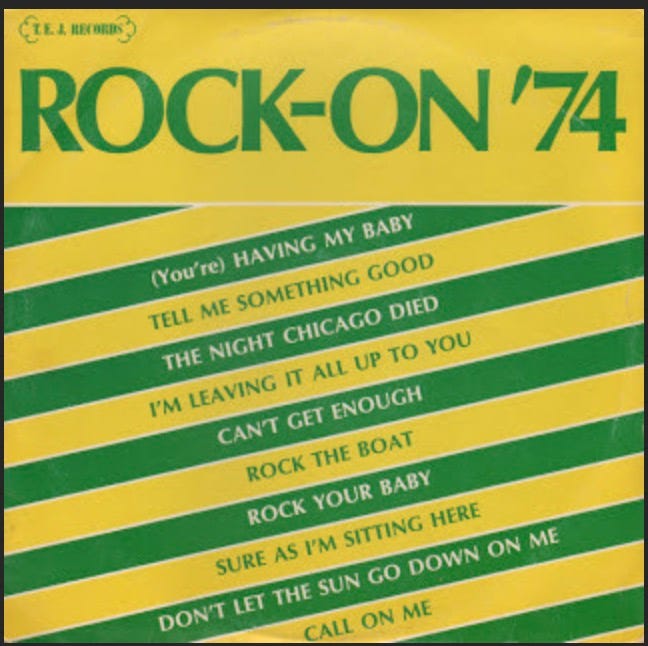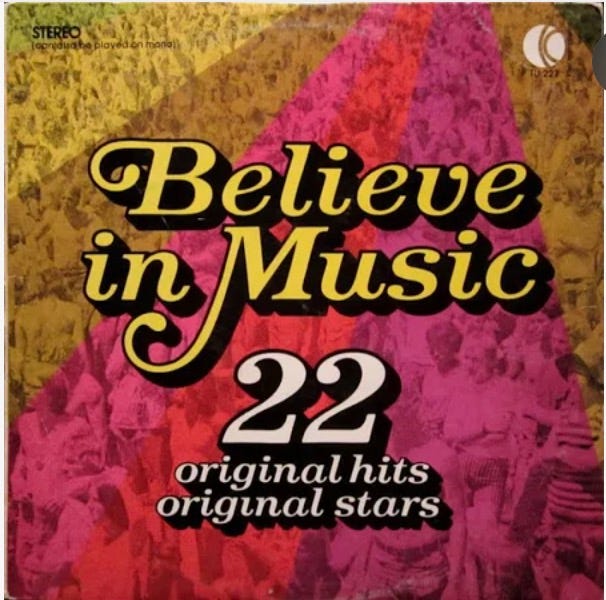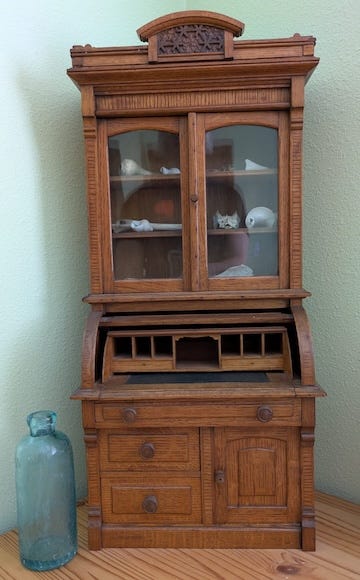My mom would have wanted me to keep going to the church she’d raised me in: the Church of Christ, on a leafy corner of a street full of houses, on Chicago’s Northwest Side. I know she would have, because prior to one of her many surgeries, she wrote a short letter to her sister asking her to help my dad with me if she, my mom, didn’t survive. Specifically, “be sure and take her to church.” I wonder how my mom pictured this working? We lived more than 500 miles from my aunt.
My mom survived for another three years, until I was eleven. By the time she died, we hadn’t been to church in over a year and I didn’t miss it. Sunday school had always felt like an errand, in which I had to wait around for my mom, more than like school. I didn’t make friends there, maybe because I only saw those kids once a week. Or maybe I was just impatient at having to be there at all.
My mom loved her church friends, and church itself, and the Church of Christ religion, the whole kit and caboodle. She grew up in the rural south, and church was like a home in the city. But I was born in Chicago in the 1960s. My friends and classmates and our neighbors were Catholic, Jewish, and other religions I didn’t know anything about, and they were from other countries—I can think of seven countries kids at school were from without even trying.
I believed what I heard in church, except that I didn’t believe we Church of Christ Christians were the chosen people. All my friends and almost everybody we knew were going to hell? Not possible.
After my mom’s death, my dad, who had grown up Catholic in Chicago, offered to start taking me to my mom’s church again. I said I didn’t want to go. My mom’s love of her church had not been contagious.
Rules and Records
People say the Church of Christ is strict and forbidding. No drinking even at weddings, no dancing, no music at the service, no this, no that. It’s fundamentalist at home and evangelical abroad, missionarying to many countries. Somebody on Reddit even says it’s a cult.
I didn’t experience those forceful controls. My mom’s prohibitions didn’t feel onerous: I couldn’t say “Oh my God,” like all the other kids did, and I couldn’t watch certain TV shows (like Sonny and Cher, with the immodest outfits). And of course I had to go to church in a dress.
When we moved into our house, when I was eight, my mom had my dad install lights in the backyard so I could have parties out there when I was a teenager. I don’t think she would have insisted on no dancing. I don’t think she would have forced me to marry my first boyfriend, even though a Chuch of Christ relative in my generation was forced to do just that.
The first songs I remember learning by heart were “Doe, a Deer” and “Jesus Loves Me.” The records on our hi-fi were show-tune albums like “My Fair Lady” and “Mary Poppins,” and some country and western albums.
My religious mom, to my surprise, bought two or three drugstore record albums for me when I was about nine—rock-music compilations.


I had hardly heard rock music at all by that time. My mom must have wanted me to keep up with what other kids liked, since I was an only child and a bookworm content to read and listen to Christmas carols and Johnny Cash. When my mom gave me these rock records, I felt very aware that I was part of a new generation and I needed to know this music. So I listened and listened to “Let it Rain” and “Sylvia’s Mother Says” and “Brandy (You’re a Fine Girl)” and lots of others. These records had at least ten songs on each side!
That’s all just to say we didn’t act religious at home. Church didn’t exist for me until Sunday morning came and I hadn’t memorized the week’s Bible verse.
All those books
My mom only read magazines—not books. I never even saw her read the Bible. We did have one, bound in black pleather with gold-stamped letters on the front, and she gave me one of my own for Christmas when I was seven.

To me these were high-value talismans of my mom’s, like the handmade miniature secretary-desk that a skilled woodworking artist had given her, or the stained-glass window she had discovered in an attic crawl space. She didn’t have good jewelry—she liked old things she and my dad could fix up.

My dad only read newspapers.
This all means that books were my department.
But for some reason, the built-in bookshelves beside our fireplace were full of books by the novelist Winston Churchill (not the statesman), a biography of John F. Kennedy and a memoir by Jack Paar (I Kid You Not), and a dystopian-future sci-fi by Ira Levin for some reason, which contained the first sex scene I ever read. (I still remember parts of it.)
I asked my dad about the books. “Those are your mom’s,” he said.

So I figured someday I’d see her reading them. It simmered in the back of my mind to ask my mom if the books were just decoration, but I never did. Today I am pretty sure that’s what they were. I imagine her at the junk shoppe putting them into a box to take home, thinking, Churchill will look great—serious and worldly—on our shelves.
We also had lots of Readers Digest Condensed Books. Those, and the Jack Paar book, were my introduction to novels and memoir. I remember reading an abridged Jaws (so I would have been over ten by then) and maybe some novel about a rabid dog—not Stephen King, this was too early for that—and I loved browsing in the Name Your Baby book and the astrology book also on the shelves.
Astrology book? Would my churchgoing mom have bought that? The more I think about all the books she gave me, the records, and how she loved to meet and talk with anyone she could, I think she was driven by curiosity (as am I). And she was secure enough in her beliefs that she could explore cultural material that other fundamentalist Christians would have turned away from.
She bought used books for me, too: all of the early Hardy Boys books, sci-fi by Jules Verne, and books on science and evolution.
I remember talking with her about the idea that “man came from a monkey.”
Maybe, I said (after reading about black holes and light years) the six days of Creation were really like a million years or a billion years each.
“Maybe so,” my mom said. I think she had no problem believing in God’s literal creation of the world, and in science, both.
What would she have wanted me to believe as I grew up? What kind of conflict would we have had, or would I have had within myself? She definitely wanted me to be educated and she definitely wanted me to go to church.
Maybe she wasn’t as devout as I think she was? But if she wasn’t, she wouldn’t have insisted on going to church on any day she was barely well enough to, and wouldn’t have made me come along every single Sunday with no exceptions. She wouldn’t have forbidden me from using the Lord’s name in vain, and wouldn’t have emphasized to her sister that she should take me to church after my mom was dead.
In eighth grade, feeling depressed, I pulled my Bible off the shelf and browsed in it. My born-again neighbor friend had suggested this. But I couldn’t get interested in it. Just like when I was eight or nine, nothing I saw in the Bible seemed to apply to my world. By seventeen, I was an atheist.
What if?
Several years later was when I saw that our conservative church had been a tool in the hands of my mother, and I can see it had shaped me no matter how unaware of it I was.
“Turn the other cheek” in my world meant giving friends the benefit of the doubt rather than blaming.
“Don’t boast of your good deeds or accomplishments because only God needs to see them” meant being unassuming and not bragging.
More subtly, our unfamous, no-frills church had fostered a gemlike sense of uniqueness. In religious terms, this would have meant standing strong and uncompromised in my faith in the face of persecution—but that wasn’t the world I lived in. To me, a secular-minded kid, this identity and its integrity meant I should be outspoken with my thoughts, a nonconformist even, true to my inner genuine self.
At twelve, that genuine self was a girl who loathed feminine trappings. I didn’t want to be seen first and foremost as a “girl,” as pretty, as a boy-attractor. I wanted to be the equal of boys, with my ideas taken as seriously as theirs. My notion of integrity meant not trying to please boys, but avoiding them.
By the time I started high school, motherless for three years by then, my ideals had crystallized into a policy: not attracting attention, not flirting, not going to parties, not drinking, and not fooling around with boys—all things I considered “corrupt,” the inside-my-head term for experiences that I judged would damage me.
Without my mother’s guidance, I nevertheless avoided the so-easy nightmare of getting pregnant. My dad reinforced, severely, the imperative not to. But maybe I also was determined to live up to my mom’s standards. At thirteen, growing up in the wake of the hippies and the Pill, I thought Free Love was mostly a rationale for guys to pressure women for sex, and I wouldn’t let that happen. At the same time, I never thought I would wait until I got married to have sex. That seemed to me, long before I even started dating, like a bad idea.
Would my mom have expected me to remain sexually inexperienced until marriage? Maybe yes? I wonder if, when she was still healthy, she perceived the extent to which I lived in a different culture than hers—Chicago in the early 1970s versus rural, Christian Missouri in the 1940s.
When I grew up, the way for me and my peers to have a love life was to use safe contraception and be monogamous with one long-term partner at a time. If I had gotten pregnant, would my mom have tried to stop me from having an abortion? According to the Church of Christ perspective, and for other reasons based on events in her life, I think she would have. I’m glad I never had to make that decision. But it makes me wonder: who would I have been if she had survived to steer me through high school and starting my own life?
She loved seeing me learn and discover my own interests. She was one hundred percent practical and grounded in reality. She also was judgmental in some ways and very conservative, and she was 37 years older than I was. As I made choices big and small, with only my dad and my friends as guides, I did have a grim sense of freedom to do what I wanted without my conservative and forceful mom to push me. But would she have pushed me to do what she wanted, or would she have assimilated her guidance into my actual world? I don’t know.
So in high school I protected myself with my rigid refusals to socialize for fear of things going very badly. When I went to college, my inner yardstick—the echoing influence of my mother, maybe?—helped shape my new relationships with new people. The modesty and the “no premarital sex” values, which I’d absorbed from the Church of Christ via my mom, were now filtered through my be-yourself esthetic just like they were at age twelve: don’t dress to attract; dress to feel relaxed and genuine, ie, as androgynously as possible. Make it clear to dates that we are not having sex right away, if ever.
By then, in many ways, I was (often, not always) smart enough to foresee what might come from different choices. I had kept my eyes open all along. I applied my own moral standards to relationships. I was okay. My early religious upbringing and the strength infused by my mother were two sides of the same shield.




Fran, your writing really flows here. This is memoir 🙌🏽
While we can all play the what if game about how things would have turned out differently with different input/situations, your story is that of a headstrong youth that made her own decisions. I suspect that would have changed much if your mother lived until your adulthood.